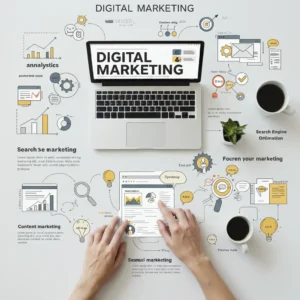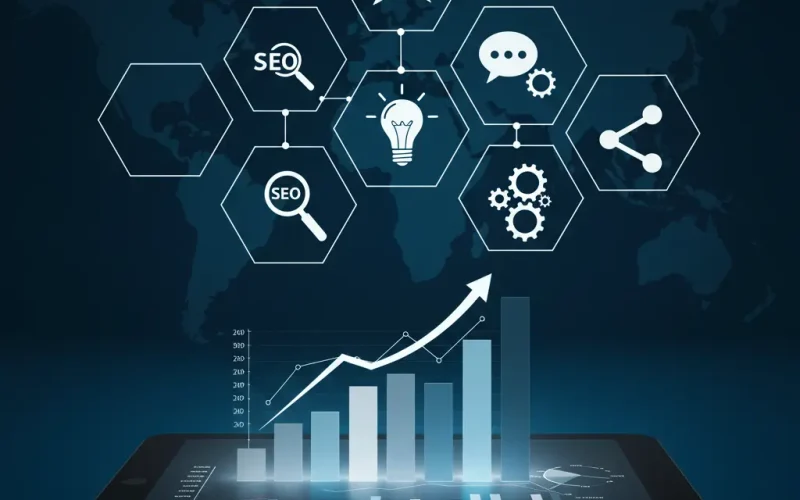Digital marketing in the age of modern technology has become an integral part of any successful business strategy. Whether you are a small business owner or working for a large company, understanding and utilizing digital marketing strategies can make the difference between success and failure. In this article, we will review five key digital marketing strategies that will help you achieve your goals more efficiently and effectively.
1. Search Engine Optimization (SEO)
Search Engine Optimization (SEO) is the process of optimizing your website to appear in the top results of search engines like Google. SEO is one of the most important tools in digital marketing because it helps increase organic traffic to your site.
Why is SEO important?
- Increases your online visibility.
- Enhances trust and credibility.
- Reduces the cost of paid advertisements.
How to improve SEO:
- Keywords: Choose keywords relevant to your site’s content.
- Content: Create high-quality and useful content.
- Site speed: Ensure your site loads quickly.
- Internal and external links: Use links strategically.
|
SEO Element
|
Importance
|
|---|---|
|
Keywords
|
Help target the right audience.
|
|
Content
|
Enhances user experience and improves search rankings.
|
|
Site Speed
|
Affects bounce rate and search rankings.
|
|
Internal Links
|
Helps search engines understand your site’s structure.
|
2. Social Media Marketing
Social media platforms are no longer just places to connect with friends; they have also become powerful platforms for companies to promote their products and services. Through social media marketing strategies, you can reach a wide audience in creative ways.

Popular Social Media Platforms:
- Facebook: Suitable for paid ads and customer interaction.
- Instagram: Ideal for photos and short videos.
- Twitter: Great for quick updates and live events.
- LinkedIn: Dedicated to business and professionals.
Tips for Social Media Marketing:
- Audience Analysis: Understand your audience’s interests and needs.
- Visual Content: Use images and videos to grab attention.
- Direct Communication: Respond to comments and inquiries promptly.
|
Social Media Platform
|
Most Suitable Content Type
|
Target Audience
|
|---|---|---|
|
Facebook
|
Articles, Images, Videos
|
All age groups
|
|
Instagram
|
Photos and Short Videos
|
Youth and teenagers
|
|
Twitter
|
Short Tweets
|
Professionals and consumers
|
|
LinkedIn
|
Professional Articles
|
Businessmen and companies
|
3. Content Marketing
Content marketing is a strategy that relies on creating and distributing valuable content to attract an audience and convert them into customers. This type of marketing focuses on providing useful information rather than direct selling.
Benefits of Content Marketing:
- Building trust with customers.
- Improving search engine rankings.
- Increasing audience engagement.
Examples of Content Types:
- Blogs: Educational or instructional articles.
- Videos: Tutorials or interviews.
- E-books: In-depth materials on specific topics.
|
Content Type
|
Main Goal
|
Tools Used
|
|---|---|---|
|
Blogs
|
Improve SEO and attract visitors
|
WordPress, Medium
|
|
Videos
|
Increase engagement
|
YouTube, TikTok
|
|
E-books
|
Generate leads
|
Canva, Adobe InDesign
|
4. Email Marketing
Despite the presence of many modern tools, email marketing remains one of the most effective ways to reach customers. This type of marketing allows you to communicate directly with your audience and send personalized messages.
Benefits of Email Marketing:
- Low cost compared to traditional advertising.
- Easy tracking of results.
- Building long-term relationships with customers.
Tips for Creating a Successful Email Campaign:
- Catchy Subject Line: Make the subject intriguing to encourage opening.
- Personalized Content: Use customer data to tailor messages.
- Good Design: Ensure the email looks professional.
|
Campaign Element
|
Importance
|
|---|---|
|
Subject
|
Determines whether the email will be opened or not.
|
|
Content
|
Should be useful and relevant to the recipient’s interests.
|
|
Design
|
Should be attractive and easy to read.
|
5. Paid Advertising (PPC)
Paid advertising, also known as “Pay-Per-Click” (PPC), is a marketing strategy that allows you to pay a fee each time someone clicks on your ad. This method is one of the fastest ways to drive traffic to your site.
Advantages of Paid Advertising:
- Quick access to the target audience.
- Full control over the budget.
- Precise measurement of results.
Paid Advertising Platforms:
- Google Ads: Suitable for text ads.
- Facebook Ads: Suitable for visual ads.
- Instagram Ads: Ideal for visually appealing products.
|
Advertising Platform
|
Ad Type
|
Target Audience
|
|---|---|---|
|
Google Ads
|
Texts, Videos
|
All categories
|
|
Facebook Ads
|
Images, Videos
|
Youth and families
|
|
Instagram Ads
|
Images, Stories
|
Youth and teenagers
|
Conclusion
In the fast-changing world of digital marketing, it is essential to stay informed about the latest and most effective strategies. By focusing on Search Engine Optimization (SEO), social media marketing, content marketing, email marketing, and paid advertising, you can achieve remarkable results for your business.
Always remember that success in digital marketing depends on good planning and continuous analysis. Apply these five strategies and watch how your business grows significantly.
 العربية
العربية
